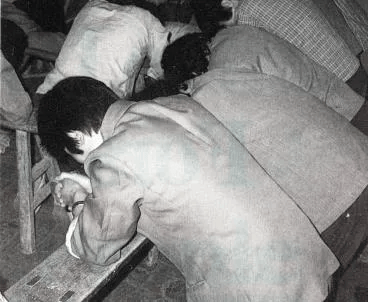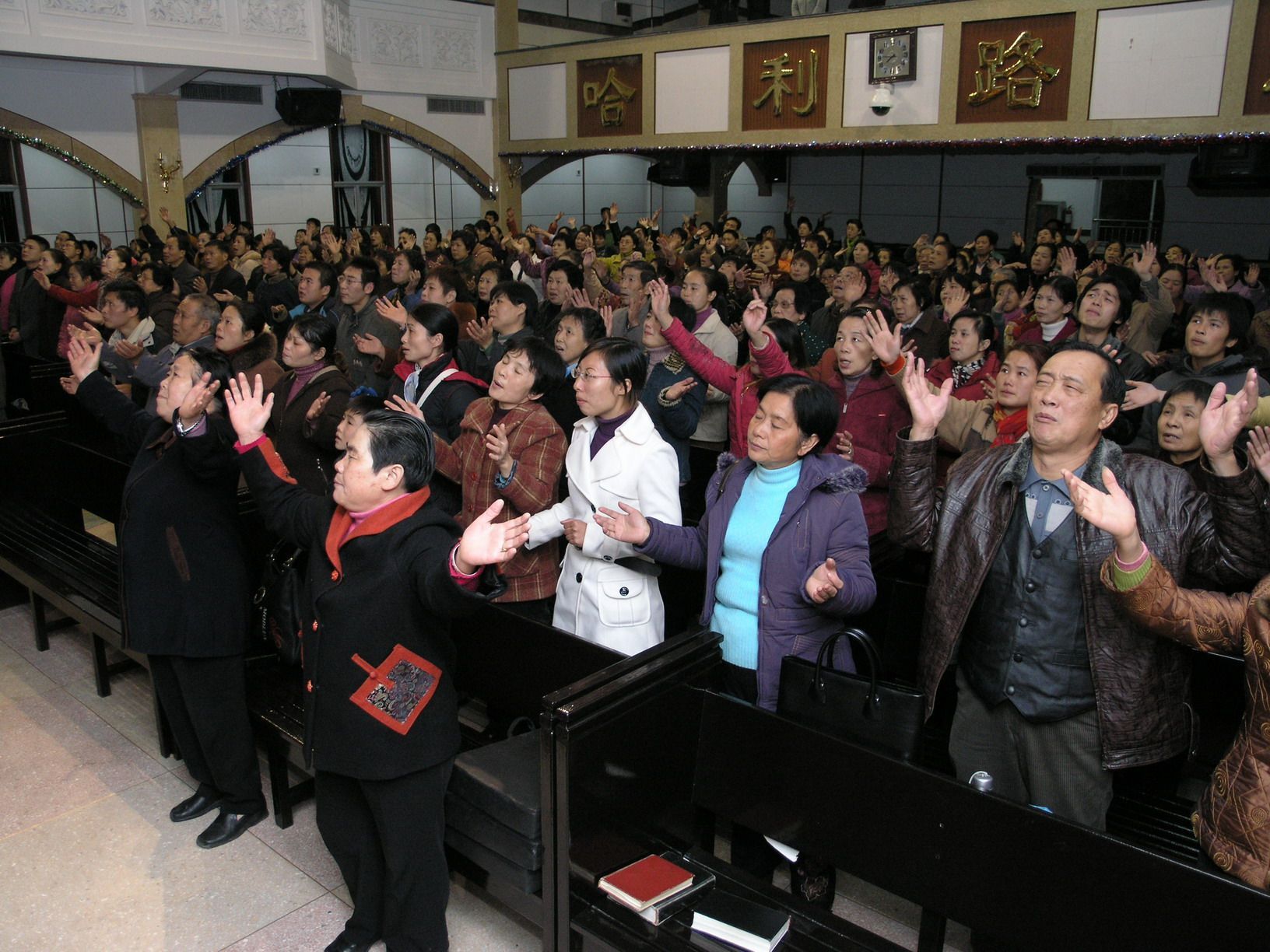1960s

House church men praying on their knees.
By 1966, Mao's China was lurching toward a precipice. He launched the Cultural Revolution, which resulted in the deaths of tens of millions of people, and which reshaped Chinese society more in ten years than any other event in China's history. Customs and traditions that had taken millennia to foster were cast aside as the Red Guard swept throughout the length and breadth of the land. During the Cultural Revolution, "all visible churches in Shandong were closed, pastors imprisoned, and church buildings were used for Communist propaganda centers or supply houses. In the midst of this harsh persecution, however, God wonderfully multiplied His church." 1
Many years later, a report shared how revival had broken out again in Shandong in 1965. By that time, all denominational churches had been disbanded, but the Holy Spirit visited believers in simple house church gatherings throughout the province. In the 1980s one Christian recalled the depth of spiritual life he found in the fellowships he visited in Shandong at the time:
"I truly feel grateful to the Lord for His grace—for allowing a man of small faith to witness His mighty acts in person. What we human beings cannot do, God can do. The church is a beautiful testimony to this fact.
The revival here began in 1965. During the Cultural Revolution, many young people were moved by the Holy Spirit and rose up to preach the gospel. Some were arrested, others struggled against, and still others persecuted. But nevertheless, they did not forsake the faith; on the contrary, their faith became even stronger. These people today are the pillars of the Church.
Today there are no officially open churches here, but house churches are everywhere. In each of these house church meetings, there are maybe 20 to 30, 50 to 60, over 100 or sometimes even 200 people. The government knows about these meetings, but they do not bother them.
I saw how the brothers and sisters who preached came from all kinds of vocations and across other boundaries; there were workers, teachers, cobblers, and others. Among them were many young people with tremendous gifts of preaching.
One house church arranged for no more than six people to give their testimonies. After these six had spoken, there were many others who wanted to stand up and give their testimonies....
The county here has a population of around half a million. Those who believe in the Lord number 50,000-60,000, and among them Christian sisters are the majority." 2
Pastor Tian
On a trip to China in 2001, the author had the privilege of meeting a house church leader from Shandong whose father, Pastor Tian, 3 had been gloriously martyred for Christ during the Cultural Revolution. Tears rolled down his cheeks as he recounted his father’s experiences. Here is Pastor Tian’s testimony in the words of his son:
"In 1967, in the coalmining city of Zibo in northern Shandong, my father was arrested for being a preacher of the gospel. The Red Guards beat him almost to death. He was covered in blood and many of his bones were broken. The tortures they gave him were indescribable. My skin stands up even today when I think about that day. The guards forced me and my son (his grandson) to witness the torture.
After the beatings my dad’s barely-alive body was placed on a trolley with wheels. My son and I were required to push him around the city streets so that people could see the terrible fate that would befall anyone who preaches the gospel. The mobs hurled insults and missiles at us as we struggled to protect my beloved father’s body from the taunts and fury of the crowds. My dad, who had served the Lord for many years, was labelled a 'counter revolutionary' and an 'enemy of the state,' but I knew that nobody loved China more than my father. He had wept in prayer many times for the salvation of the Mother Land.
The guards forced us to enter a cemetery, where they had erected a platform to hold a mock trial. Hundreds of people gathered to watch. They propped my father up and told him he had one last chance to be forgiven of his crimes. If he would just renounce Christianity and his belief in Christ he would be set free. If not, the guards threatened, he would regret his decision. 'We offer you this precious chance for life. Choose wisely,' they snarled.
After waiting for the crowd to fall silent, my father began to speak in a clear, loud voice. This was a miracle in itself because he was in such terrible shape after the beatings he had endured. To the crowd of shocked onlookers and Red Guards, he boldly declared, ‘You can cut my head off, and you can spill my blood, but I will NEVER forsake Jesus Christ! He has been faithful and has blessed me for many years, and nothing you do can ever make me renounce my loving friend and Savior.’
As soon as these words came out of my dad's mouth, a mob of enraged guards leapt onto the stage, thrashing him with their fists and steel-capped boots. They flung his body off the stage and continued to beat him as he lay in the mud. Many people in the crowd wept loudly but they could do nothing to stop the carnage.
My father was beaten to death in front of my eyes. His faith and courage left a deep impression on me, and I decided to be fully committed to the Lord Jesus Christ for the rest of my life. Many other Christians in the crowd were also strengthened by my father’s example.
Because my dad was willing to endure to the end, great fruit has resulted. I still follow Christ, as does my son and my grandson. Three generations have followed the Lord, and we hope many more generations to come will do so as well!” 4
A Letter from Behind the Curtain
After China sealed its borders off from the rest of the world, the global Body of Christ waited patiently for any glimpses they could get into the state of the Church. Many foreign missionaries who were expelled from China publicly lamented that Christianity had been exterminated; saying that if the doors even reopened the gospel would need to start again from scratch.
Insights into how the Church in Shandong was coping at the time were impossible to ascertain, although one source later estimated there were 70,000 Christians living throughout the province in 1965, meeting in 350 different churches. 5
Rare snippets of information did filter out of Shandong from time to time. The waiting Christian world treated each word like unexpected news from a long-lost family member.
In 1968 a Hong Kong pastor received this letter from a Christian in China, which offered a slither of hope that all was not lost among Christians living behind Mao's Bamboo Curtain. The letter said,
"As I am an expert in engineering, I held a high post and received a nice salary. I enjoyed my life, but now as a result of the Cultural Revolution I have lost my job and salary and everything. I am now working as a common laborer. However, I rejoice in that I have regained the full joy in Christ. I know there are other friends who have the same experience." 6
© This article is an extract from Paul Hattaway's book 'Shandong: The Revival Province'. You can order this or any of The China Chronicles books and e-books from our online bookstore.
1. Jonathan Chao (ed.), The China Mission Handbook: A Portrait of China and its Church (Hong Kong: Chinese Church Research Center, 1989), p. 125.
2. Jonathan Chao, Wise as Serpents, Harmless as Doves (Pasadena, CA: William Carey Library, 1988), pp. 114-15.
3. Name has been changed for security reasons.
4. Personal interview with Pastor Tian’s son, September 2001; published in Hattaway, China’s Unreached Cities: Vol. 2, pp. 52-3; and The Commission (June 2002), p. 29.
5. Global Chinese Ministries (October 2003).
6. Leslie T. Lyall, Red Sky at Night: Communism Confronts Christianity in China (London: Hodder & Stoughton, 1969), p. 43.





